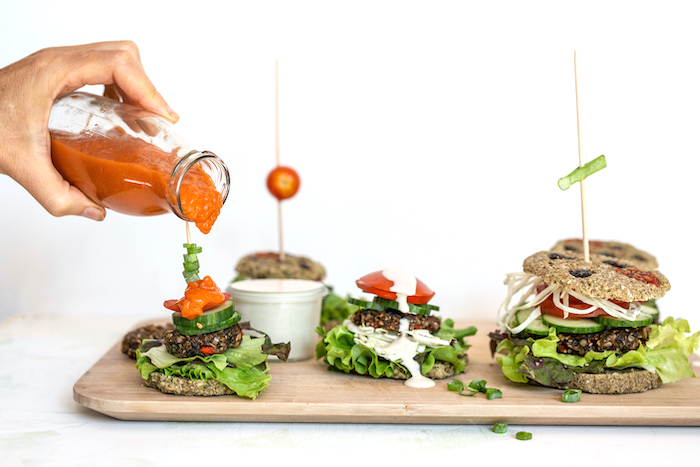We have some essential tips for you to help avoid the 3 most frequent mistakes in the vegan diet. Because if not done correctly, being vegan can be anything but healthy.
But the fact is: When done the right way, vegan nutrition has wonderful nutritional potential. Anyone who understands the essential parameters of veganism can discover new meanings for what a meal can really be, which has an incredible effect on overall health, and makes it possible to live a trend-setting and sustainable lifestyle.
The 3 most common mistakes
1. The vegan diet is automatically considered healthy
Many people automatically associate “vegan” with “healthy.” Animal products are simply forgone without considering how these dietary changes may alter nutritional intake. White flour, sugar, and highly processed products with high salt and fat content (hydrogenated, and usually rich in omega-6 fatty acids), flavor enhancers, or other additives often play a major role in this kind of vegan diet. This is not all that surprising, since so many highly processed vegan substitute products are very temptingly advertised in supermarkets. The fact that these products have rather unfavorable nutritional value is unfortunately withheld from us.
Sugar and white flour
The excessive consumption of concentrated carbohydrates like sugar and white flour is part of the biggest change in nutritional history. For thousands of years before industrialization, humans subsisted on natural foods, and not at all on highly processed foods.
Regular consumption of isolated carbohydrates causes a higher-than-average increase in blood sugar levels. Consequently, the pancreas is forced to provide huge amounts of insulin to get the sugars out of the blood and into the cells. Permanently elevated blood sugar and insulin levels strain the blood vessels and promote obesity, diabetes, chronic inflammatory processes, and dementia, among other things.
Processed products
Another common problem is the consumption of vegan meat alternatives and processed products. While these can make dietary changes a little easier, they should very rarely be incorporated into the diet. They’re usually highly processed and often contain ingredients that we don’t want but will eat unconsciously if we don’t read the ingredient list before we buy it. For example, vegan convenience foods often hide a lot of sugar, salt, unhealthy fats (hydrogenated, usually rich in omega-6 fatty acids), flavor enhancers, and thickeners.
Unhealthy fats
Consuming fatty acid that has a ratio higher in omega-6 fatty acid can be particularly serious.
What does it mean for omega-3 and omega-6 fatty acids to be out of balance?
>> While messengers from omega-3 fatty acids have an anti-inflammatory effect, in contrast, those from omega-6 fatty acids promote inflammation.
>> Too many omega-6 fatty acids promote blood clotting, heart attacks, arteriosclerosis, strokes, cancer, and inflammatory processes in the body.
A large amount of omega-6 fatty acids are found in all products that contain sunflower oil, like most vegan spreads, as well as quite a few types of nuts.
Note: Today, the omega-6 to omega-3 fatty acid ratio averages 20:1. According to the recommendations of the German Nutrition Society (GNS), it should be less than 5:1.
2. Nutrient content is not taken into account
If animal products are simply removed from a person’s diet, this can result in an inadequate supply of nutrients. So it’s good to know that the German Nutrition Society (GNS) classifies the supply of the following nutrients as crucial in a purely plant-based diet: calcium, iron, iodine, selenium, zinc, omega-3 fatty acids, proteins, vitamin D, and vitamin B12. We will cover how to get the right amount of these nutrients in the second part of the article.
Are you interested in gaining a comprehensive understanding of the health benefits of a plant-based diet? Download the curriculum for our Holistic Nutrition Coach training program.
3. Soy products are assumed to be healthy
In recent years, plant-based alternatives to animal products have started to take over the shelves in supermarkets. Vegan sausages, soy milk, cream, and yogurt, or even tofu are touted as ideal substitutes for animal products and have become very popular, especially for people switching to a vegan diet.
Soy products have a lot of advantages: they are lactose-free, milk protein-free, and gluten-free. The soybean has a high protein and nutrient content. It’s rich in monounsaturated and polyunsaturated fatty acids and contains all the essential amino acids that the body can’t produce itself.
Nevertheless, we need to be critical of the consumption of soy products for several reasons:
- The majority of soy production takes place in North and South America with the use of genetically modified seeds, to a great extent. So with that in mind, it’s important to pay attention to soy products of European origin.
- Soybeans are subject to intensive, multi-stage processing and manufacturing to become the finished products that end up on the supermarket shelf. For example, soy milk is made from the press cake left over from soybean oil production. This press cake is soaked with water, finely mashed, and then finally filtered.
- Soybeans contain isoflavones, which are structurally similar to the human hormone estrogen and can create hormone imbalance.
- Soybeans are difficult to digest because they contain enzyme inhibitors called trypsin inhibitors. These are proteins that prevent the digestive enzyme trypsin from doing its job and thus significantly reduce protein digestibility. Secondly, they contain phytic acids, which have been shown to block the absorption of the minerals calcium, magnesium, copper, iron, and zinc.
- Poorly or partially digested proteins promote putrefaction and toxin formation in the intestine and overwork the intestinal flora and immune system in the long term. This can result in leaky gut and food allergies. About 40% of the Western population is more or less allergic to soy.
- Soybeans are considered pro-inflammatory because their fats form an unfavorable ratio of omega-3 to omega-6 fatty acids.
Tip:
We recommend fermented soy products like tempeh, miso, natto, and tamari (soy sauce). Fermentation makes the nutrients in the soybean more bioavailable and breaks down toxins.
The health-promoting potential of vegan nutrition
Veganism has the potential to be an excellent an excellent form of nutrition, as long as one knows how to approach it the right way.
It’s ideal to take any pertinent health aspects into account right from the start when switching to a vegan diet and to enter this new world of food with curiosity. This will open up an infinite spectrum of plant-based foods and their health benefits.
1. High nutrient density – low energy density
Natural plant foods provide us with huge advantages to our health, so it follows that vegan nutrition, or especially raw vegan nutrition, would have incredible benefits.
Natural plant foods have a high nutrient density, with a rather low energy density. This means that they contain comparatively few calories but, depending on their freshness, provide us with plenty of biophotons, vitamins, minerals, enzymes, fiber, and secondary phytonutrients, all within a natural complex of active ingredients!
Getting enough vitamin B9 (folic acid), C and E, beta carotene, and magnesium is especially valuable. Even the nutrients that are classified as potentially crucial in the vegan diet still need to be properly balanced, which can be done with the right background knowledge, and taking into account the freshness of ingredients and good food combinations. The exception to this is vitamin B12 and vitamin D.
For your optimal raw vegan nutrient supply, click HERE !!
2. Problematic ingredients are removed
Ingredients from animal products that are classified as problematic from a health point of view are simply nowhere to be found in plant-based foods. Plant foods contain no cholesterol, no purines, and hardly any saturated fatty acids, but plenty of dietary fiber and phytonutrients. Numerous studies show that people with high consumption of plant foods have a lower risk of a wide variety of diet-related diseases like type 2 diabetes, high blood pressure, and cardiovascular disease.
A diet of predominantly fresh ingredients also eliminates the disadvantages that come with highly processed vegan products, like white flour, sugar, isolated salt, hydrogenated, and/or omega-6-rich fats.
3. The active ingredient complex of natural foods
The trend towards so-called “functional foods” began during industrialization, and is currently reaching its peak when it comes to vegan convenience foods.
As an example, the ingredient list of a lupine ice cream advertised as healthy:
Water, glucose syrup, sugar, coconut fat, lupine protein (2.7%), natural vanilla flavor, ground vanilla beans, color: beta carotene, emulsifier: mono- and diglycerides of fatty acids (canola), thickener: (locust bean gum, tara gum), salt.
Here, very little consideration is given to the fact that a mix of a lot of individual ingredients is completely unnatural for our bodies. On the other hand, the great advantage of a diet heavy in fresh plant foods is that here we get to enjoy the nutrients in their natural composition, and thus in the active ingredient complex that was intended by nature.
Conclusion:
The vegan diet can be considered very health-promoting and beneficial when the focus is on food that is natural and wholesome. The easiest and most consistent way to achieve this is through a plant-based diet with a high raw food content.
Additionally, it’s important to place special emphasis on the quality of food and to use organic products whenever possible. In organic farming, the use of chemical pesticides and fertilizers, and the use of genetically modified bodies are prohibited. This also contributes greatly to keeping our environment natural and helping us avoid health risks.
Would you like to join our unique, based on nutritional sciences and practice-oriented training program for gaining a high level of health?
We are more than happy to inform you about our training program on our website!







0 Comments